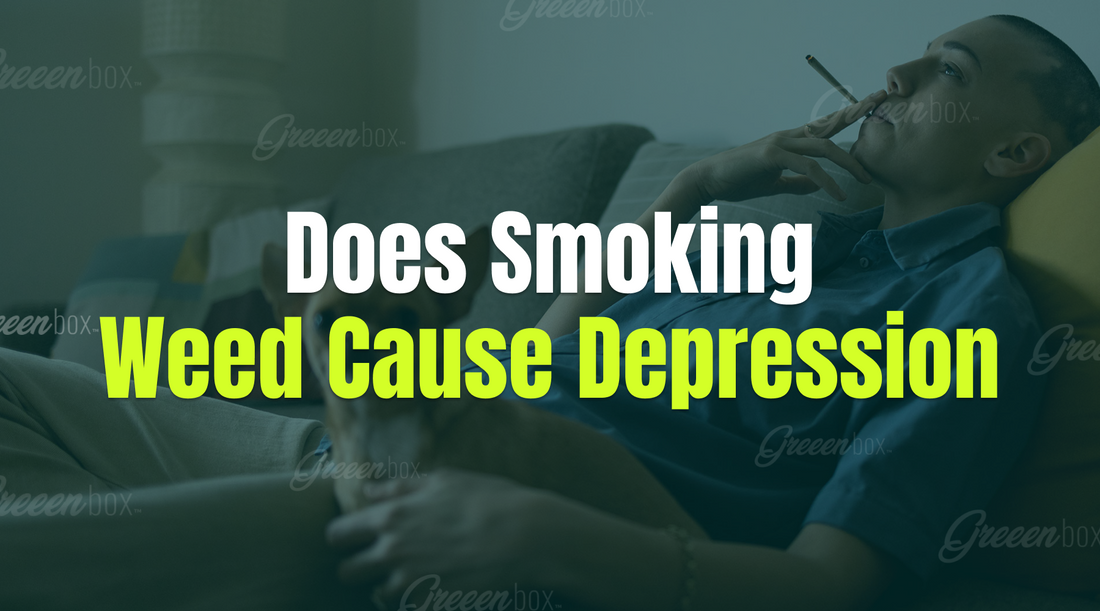The relationship between cannabis use and mental health has become an increasingly important topic of research and public discussion. As cannabis accessibility grows through legalization and changing attitudes, more people are asking questions about its potential effects on psychological well-being. While some users report positive experiences with cannabis, others describe changes in their mental state that concern them. The scientific community has been working to understand these varying experiences through rigorous research.
There might be complex patterns in how cannabis use intersects with mental health. However, individual responses can vary significantly based on numerous factors.

Flower of the Month Subscription
|

Lullaby Sleep Gummy Night Berry
|

GreeenBox Subscription
|
Can Smoking Weed Make You Depressed?
The scientific evidence shows a clear pattern of co-occurrence between cannabis use and depression, though this relationship isn't straightforward. Studies have found that cannabis users are diagnosed with depression more frequently than those who don't use cannabis. Notably, heavy or regular users show higher rates of depression diagnoses.
However, this connection appears to work both ways - while cannabis use might increase depression risk, those experiencing depression may also be more likely to use cannabis. Research has specifically identified that individuals who begin using cannabis during early adolescence may face a higher risk of developing depression.
Read more: Is Weed A Stimulant Or Depressant?
Understanding the Mechanisms
Research has identified several key mechanisms that help explain the relationship between depression from smoking weed and mental health outcomes. These mechanisms provide crucial insights into why some individuals who engage in smoking weed and depression may experience mood changes over time.
Brain Chemistry Changes
The interaction between THC and brain chemistry plays a fundamental role in understanding depression caused by smoking weed. THC, the primary psychoactive compound in cannabis, can significantly impact the brain's chemical balance:
- THC interacts directly with the brain's natural neurotransmitter systems
- These interactions may lead to alterations in mood regulation
- Regular cannabis use could potentially disrupt normal brain chemistry function
- The impact on brain chemistry may contribute to low mood states
Cognitive Function Impact
Research shows that depression in smoking weed patterns often correlates with changes in cognitive abilities. These cognitive effects can manifest in several ways:
- Decreased attention span and focus
- Reduced concentration capabilities
- Impaired problem-solving abilities
- Changes in daily cognitive functioning
These cognitive changes may contribute to depressive symptoms by affecting how individuals process information and handle daily challenges.
The Role of Anhedonia
One of the most significant findings in depression and smoking weed research involves anhedonia - the inability to feel pleasure. This mechanism is particularly noteworthy because:
- Anhedonia is a key symptom of depression
- Cannabis use may contribute to its development
- Regular users might experience diminished pleasure responses
- This effect could perpetuate depressive symptoms
Read more: Does Smoking Weed Cause Hair Loss?
Shared Risk Factors
The relationship between cannabis use and depression involves complex shared risk factors that can affect both conditions:
Genetic Factors:
- Common genetic predispositions
- Inherited vulnerability to both conditions
- Shared genetic markers
Environmental Influences:
- Common environmental stressors
- Shared social and cultural factors
- Similar life experiences that may trigger both conditions
Impact on Depression Prognosis
The relationship between smoking weed and depression becomes particularly significant when examining how cannabis use affects the course and treatment of depression. Research provides specific insights into these outcomes, especially for individuals already diagnosed with major depressive disorder.
Treatment Outcomes
Studies examining depression’s connection to smoking weed whether from cannabis subscription boxes or whatever have identified several concerning patterns regarding treatment effectiveness:
- Cannabis use disorder in the months before depression treatment significantly increases the risk of treatment resistance
- Individuals experiencing depression caused by smoking weed often show worse overall outcomes
- The persistence of depressive symptoms appears more common among regular cannabis users
- Treatment effectiveness may be compromised when cannabis use continues during therapy
Seeking Professional Help
Research indicates that depression smoking weed patterns can affect how individuals engage with mental health services:
- Regular cannabis use may reduce motivation to seek professional mental health support
- Users might delay getting necessary treatment
- The effectiveness of professional interventions can be compromised
- Treatment adherence may be affected
Treatment Response Variables
The research identifies several factors that influence how depression and smoking weed interact during treatment:
Timing Factors:
- Duration of cannabis use before treatment
- Frequency of use during treatment
- Patterns of use during recovery
Severity Indicators:
- Intensity of depressive symptoms
- Level of cannabis consumption
- Presence of other mental health conditions
Read more: What Happens To Your Body When You Stop Smoking Weed?
Short-Term vs. Long-Term Effects
Understanding the temporal aspects of smoking weed and depression is crucial, as research shows markedly different outcomes between immediate and extended use. This distinction helps explain why some individuals report conflicting experiences with cannabis use.
Immediate Effects
Studies examining short-term impacts of depression smoking weed patterns reveal:
- Some users report quick relief from depressive symptoms
- These immediate effects are typically temporary
- Short-term mood improvements may mask underlying issues
- Quick relief can reinforce the continued use
Long-Term Consequences
Research on extended cannabis use and depression caused by smoking weed shows more concerning patterns:
Documented Long-Term Effects:
- Progressive worsening of depressive symptoms over time
- Increased persistence of mood disorders
- More challenges in managing depression
- Higher likelihood of developing chronic symptoms
Usage Patterns and Outcomes
The relationship between depression from smoking weed and timing often involves:
Regular Use Impact:
- More severe depressive symptoms among consistent users
- Increased difficulty in mood regulation
- Greater challenges in treatment response
- Higher risk of developing chronic conditions
Read more: Does Smoking Weed Make You Lose Weight?
Final Thoughts
The relationship between cannabis use and depression represents a complex interplay of various factors that researchers continue to study. While the evidence shows some associations between weed and depression, the relationship isn't straightforward.
For those who choose to use cannabis, responsible consumption is crucial. At Greeen Box, we understand the importance of mindful cannabis use. Our weed boxes offer a curated selection of premium products, helping you maintain a balanced approach to consumption. Experience the convenience, thoughtfully designed to support responsible usage patterns while delivering quality products right to your door.
Ready to explore a more mindful approach to cannabis? Visit Greeen Box today and discover why so many trust us for monthly weed boxes and related essentials.



